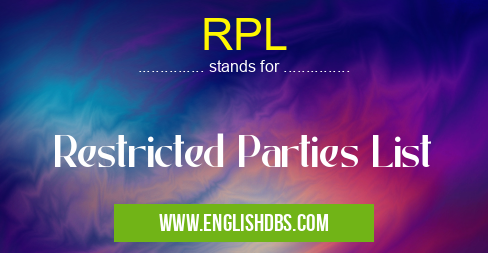What does RPL mean in UNCLASSIFIED
RPL (Restricted Parties List) is a comprehensive database maintained by the United States government that identifies individuals and entities subject to economic sanctions and other restrictions. It plays a crucial role in the enforcement of trade embargoes, anti-money laundering regulations, and counter-terrorism measures.

RPL meaning in Unclassified in Miscellaneous
RPL mostly used in an acronym Unclassified in Category Miscellaneous that means Restricted Parties List
Shorthand: RPL,
Full Form: Restricted Parties List
For more information of "Restricted Parties List", see the section below.
Meaning of RPL
RPL stands for Restricted Parties List. It is a consolidated record of persons and organizations that are prohibited from engaging in certain financial transactions, including:
- Conducting business with U.S. entities
- Receiving U.S. government funds
- Importing or exporting goods or services to or from the United States
Importance of RPL
The RPL serves as a vital tool for financial institutions, government agencies, and other organizations to:
- Prevent illicit activities: By identifying individuals and entities on the list, financial institutions can avoid facilitating transactions that violate sanctions or other regulations.
- Ensure compliance: Organizations subject to U.S. laws must regularly screen their customers against the RPL to ensure compliance with applicable regulations.
- Enhance global security: The RPL plays a role in combating terrorism, nuclear proliferation, and other threats to international stability by restricting the financial activities of designated individuals and entities.
Essential Questions and Answers on Restricted Parties List in "MISCELLANEOUS»UNFILED"
What is Restricted Parties List (RPL)?
Restricted Parties List (RPL) is a consolidated list maintained by the U.S. government that contains individuals and entities who are deemed to pose a risk to national security or foreign policy interests. It is used by government agencies, financial institutions, and other regulated entities to screen transactions and prevent interactions with sanctioned individuals or organizations.
Who is included on the RPL?
The RPL includes individuals and entities designated by various U.S. government agencies, including the Office of Foreign Assets Control (OFAC), the Bureau of Industry and Security (BIS), and the Treasury Department. These designations are based on sanctions imposed for activities such as terrorism, proliferation of weapons of mass destruction, narcotics trafficking, and human rights abuses.
What are the consequences of being on the RPL?
Being on the RPL can have significant consequences, including:
- Restrictions on financial transactions
- Denial of export or import licenses
- Prohibition from doing business with U.S. companies or government agencies
- Travel restrictions
How can I check if a person or entity is on the RPL?
You can check the RPL online using the U.S. Treasury Department's Office of Foreign Assets Control (OFAC) website. The OFAC website provides a searchable database that allows you to search for individuals or entities by name or identifying number.
What should I do if I interact with someone who is on the RPL?
If you interact with someone who is on the RPL, it is important to report the interaction to the appropriate government agency. You can do this by contacting OFAC or the agency that issued the designation. It is also important to cease all business activities with the sanctioned individual or entity.
Final Words: The RPL is an essential component of the U.S. government's efforts to combat illicit activities and promote global security. By providing a comprehensive database of restricted parties, it enables financial institutions and other organizations to make informed decisions about transactions and mitigate potential risks associated with engaging with individuals or entities subject to sanctions or other restrictions.
